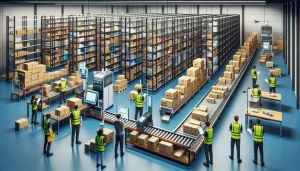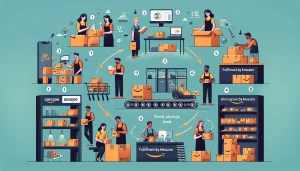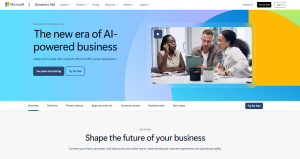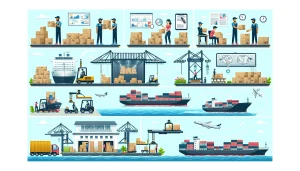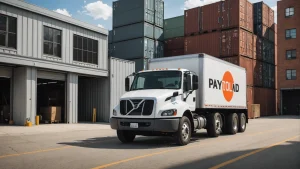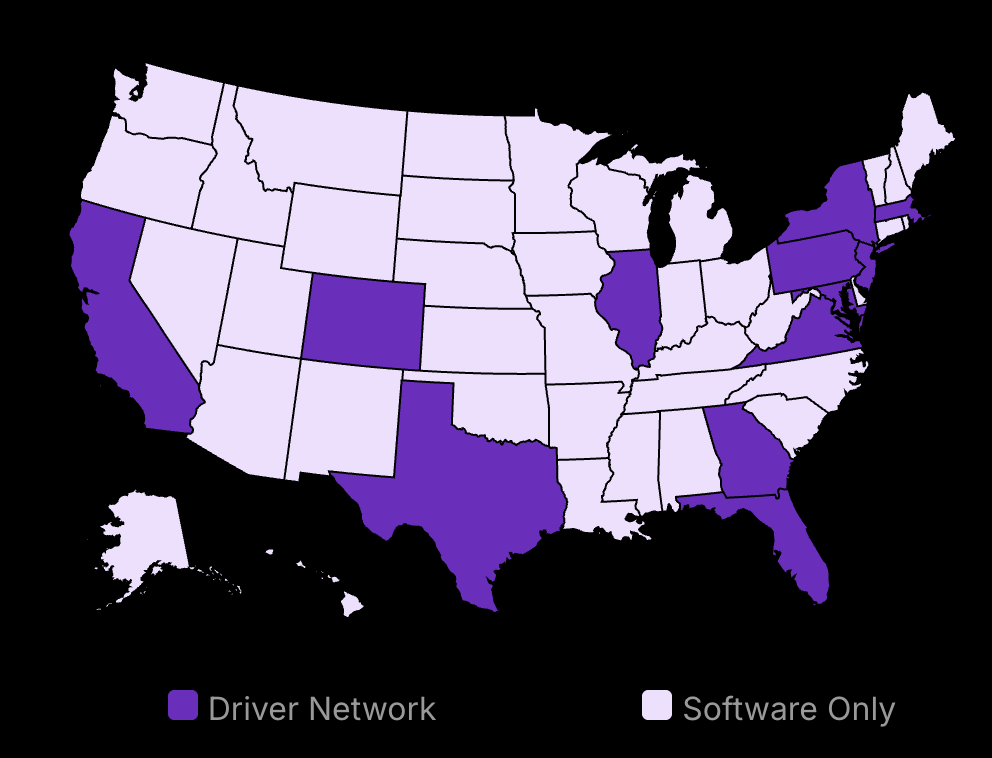Are you tired of juggling order fulfillment in-house, only to face delayed shipments and unhappy customers?
It’s time to outsource your ecommerce order fulfillment to the pros.
The right fulfillment partner can streamline your operations, reduce costs, and help you scale your business like never before.
In this guide, we’ll reveal the best order fulfillment services for ecommerce in 2024, tailored to your specific needs and goals.
From the pack and ship process to subscription box businesses, you’ll discover the perfect fit for your online store.
Get ready to level up your order fulfillment game and take your ecommerce business to new heights.

27% higher customer satisfaction
Professional delivery features:
- Real-time GPS tracking
- Automated ETA updates
- Delivery confirmation photos
- 27% higher delivery satisfaction
What is Ecommerce Order Fulfillment?
Order fulfillment is the process of receiving, processing, packing, and shipping orders to customers. It’s a critical aspect of any successful ecommerce business, as it directly impacts customer satisfaction and loyalty. The key steps in the order fulfillment process include:
Receiving and processing orders
Inventory management
Picking and packing items
Shipping and delivery
Returns and exchanges
How to Fulfill an Ecommerce Order?
Fulfilling an ecommerce order involves receiving, processing, and delivering orders to customers efficiently. The ecommerce fulfillment process is crucial for customer satisfaction and can vary depending on the method you choose—self-fulfillment, third-party fulfillment, or dropshipping. Each approach has its own advantages and challenges, and the right choice depends on your business model, resources, and goals. Exploring ecommerce fulfillment solutions? Discover how to optimize your order receiving, processing, and delivery strategies for peak efficiency.
Self-fulfillment
Self-fulfillment means that you manage the entire order fulfillment process within your business. This includes storing inventory, picking and packing products, and shipping orders directly to your customers. Self-fulfillment offers complete control over the entire fulfillment process, allowing you to maintain quality standards and personalize the customer experience. However, it requires significant investment in storage space, packing materials, and shipping logistics, as well as time and labor. This method is ideal for businesses with smaller order volumes or those looking to maintain direct oversight of their operations. Discover the intricacies of a self-fulfillment facility, where order processing, inventory management, and shipping tasks are seamlessly executed in-house.
Third-party fulfillment
Third-party fulfillment involves partnering with a fulfillment service provider to handle the logistics of order processing. The third-party fulfillment company stores your inventory, processes orders, and ships products on your behalf. This option allows you to focus on growing your business without worrying about the day-to-day logistics of order fulfillment. Third-party fulfillment is scalable and can help businesses manage large order volumes, especially during peak seasons. However, it comes with added costs and less direct control over the fulfillment process. It’s an excellent choice for businesses that want to offload logistics while ensuring timely delivery to customers.
Dropshipping
Dropshipping is a fulfillment method where you don’t keep products in stock. Instead, when a customer places an order, you purchase the item from a third party logistics third-party supplier, who then ships it directly to the customer. This model significantly reduces upfront costs, as you don’t need to invest in inventory or warehouse space. Dropshipping allows you to offer a wide range of products without the risks associated with unsold inventory. However, it also means you have less control over the shipping process and product quality, and it can result in longer shipping times. Dropshipping is a low-risk option for new businesses or those looking to expand their product offerings without significant investment.
Common Misunderstandings About Ecommerce Fulfillment Services
Many e-commerce businesses encounter misconceptions about fulfillment services that can impact their operations. Clarifying these misunderstandings can help you make better decisions for your fulfillment needs. Discover strategies to implement complimentary shipping in a way that enhances your customer appeal without eroding your bottom line.
Misconception 1: A Fulfillment Center Must Be Close to My Business.
Reality: The key is placing fulfillment centers near your customers, not your business. Analyzing customer locations and shipping data helps you position inventory where it can reduce shipping costs and delivery times.
Misconception 2: Handling Fulfillment In-House Is Always Cheaper.
Reality: Managing fulfillment in-house might be economical for smaller volumes initially, but as your business scales, the costs can increase significantly. Outsourcing fulfillment can provide greater efficiency, access to advanced technology, and scalable solutions that often lead to cost savings and operational improvements over time.
Misconception 3: Only Large Brands Benefit from Outsourcing Fulfillment.
Reality: Outsourcing fulfillment isn’t just for big players; it offers significant advantages for businesses of all sizes. Smaller brands can leverage the expertise and advanced technology of fulfillment providers without making hefty investments. This approach not only streamlines operations but also enhances scalability, allowing growing businesses to manage their logistics efficiently and focus on expanding their market presence. By outsourcing, even smaller companies can access top-tier logistics solutions that support growth and improve overall operational efficiency.
10 Best Order Fulfillment Services for Ecommerce
Selecting the right e-commerce fulfillment service can be the difference between a satisfied customer and a lost sale. Whether you’re a small business looking for local delivery or a large enterprise needing global reach, the following 10 top ecommerce fulfillment centers and services offer a range of options to suit different needs. This guide will help you understand what each service provides, so you can choose the best partner for your e-commerce business.
1. Metrobi
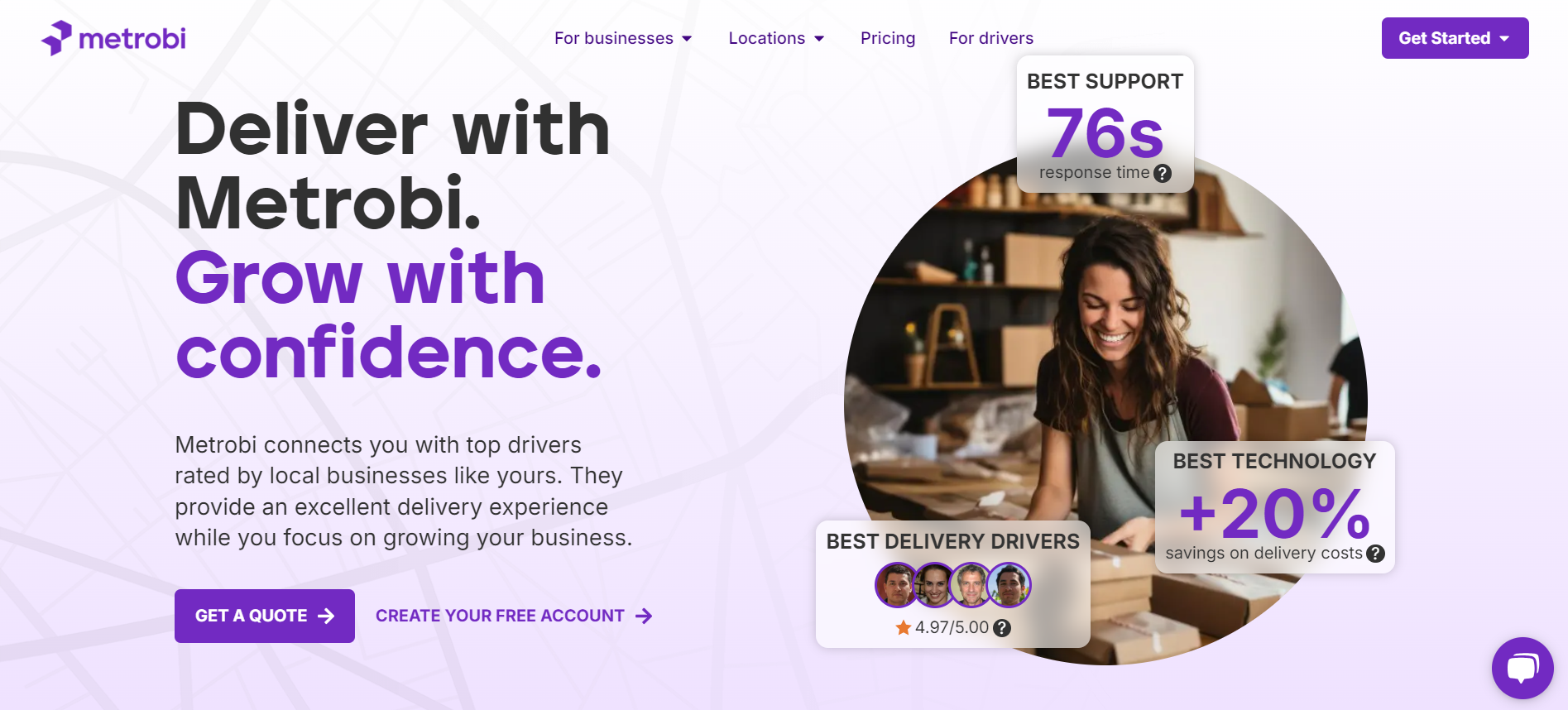
Local delivery is a critical aspect of the fulfillment process, especially for businesses operating in urban environments where speed and reliability can make or break the customer experience. Metrobi excels at last-mile delivery, providing businesses with a powerful tool to enhance their local delivery capabilities.
Unlock Local Delivery Excellence with Metrobi
Metrobi is a specialized solution designed to meet the unique challenges of urban logistics. With a focus on same-day delivery, Metrobi ensures that businesses can deliver products to their customers faster and more efficiently than ever before. Our technology-driven platform allows for real-time tracking, giving both businesses and customers complete visibility into the delivery process.
For businesses looking to stand out in competitive urban markets, Metrobi provides the ability to offer a premium delivery experience. Whether you’re delivering fresh produce, time-sensitive goods, or any other product that demands quick and reliable delivery, Metrobi has the infrastructure and expertise to ensure your customers receive their orders on time, every time.
Metrobi’s Impact on Local Businesses
As your business grows, so do your delivery needs. Metrobi scales with you, offering flexible solutions that adapt to your volume and reach. Whether you’re starting with deliveries in a single city or expanding across multiple urban areas, Metrobi ensures that your delivery operations remain smooth and efficient.
One example of Metrobi’s impact is a local business that needed to enhance its delivery service to meet increasing customer demand. By partnering with Metrobi, they were able to reduce delivery times, improve customer satisfaction, and expand their delivery area—all without the need for a significant investment in logistics infrastructure. The result? A significant increase in repeat business and customer loyalty.
How Metrobi Works
Connect your store and start sending your products.
We handle the last mile, ensuring your products are delivered quickly and efficiently.
Your customers enjoy timely deliveries, ensuring their orders arrive quickly and efficiently.
Explore more about our services and discover how we can support your business here.
2. Shopify Fulfillment Network
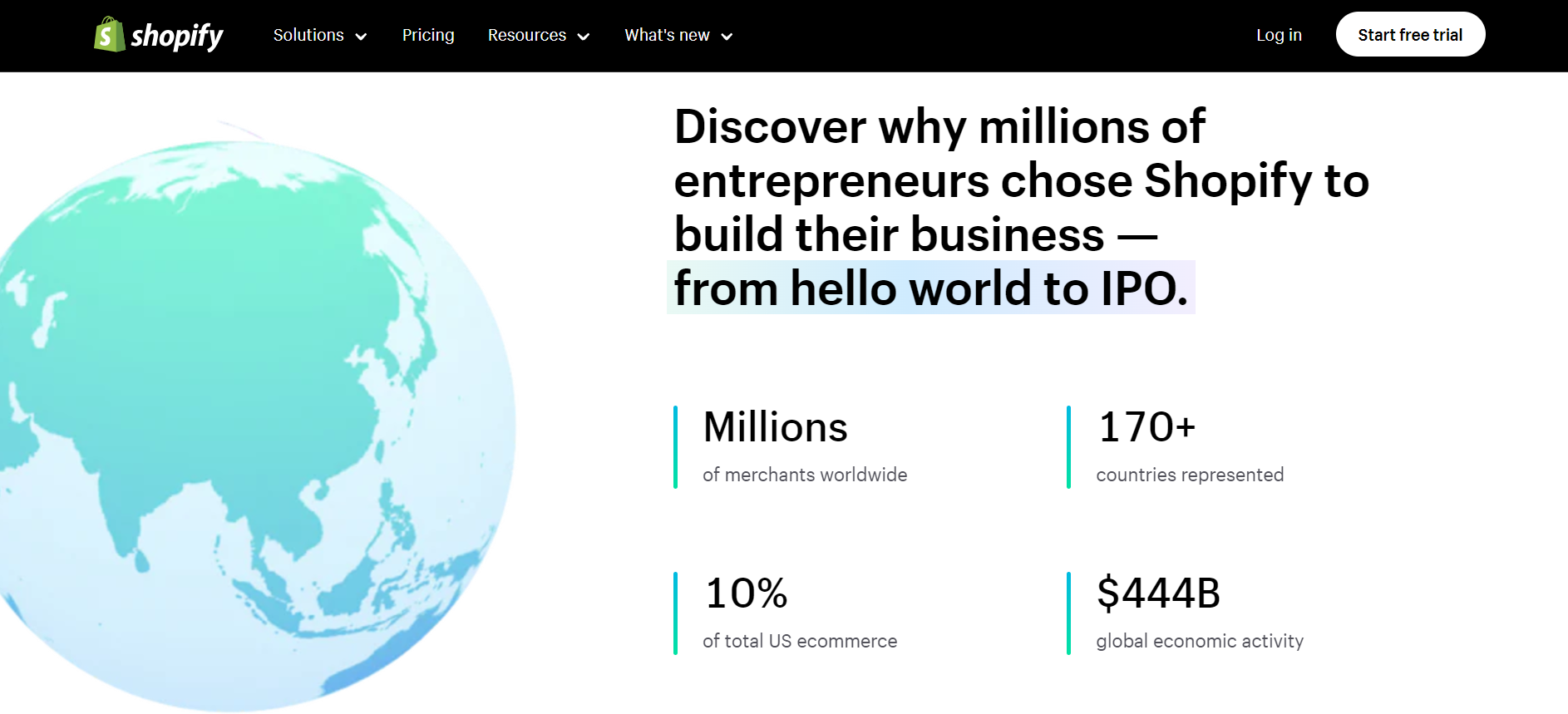
Shopify Fulfillment Network offers a comprehensive fulfillment solution tightly integrated with Shopify’s e-commerce platform. This service is designed to help businesses streamline their operations by combining sales and fulfillment into a single, easy-to-manage system. Shopify Fulfillment Network supports multi-channel fulfillment, ensuring that businesses can reach customers wherever they are shopping, whether it’s through their online store, social media, or other channels. Discover the key advantages of deploying the Shopify Fulfillment Network for seamless integration, multi-channel sales, and enhanced customer satisfaction.
Key Features: Shopify provides automated inventory management, real-time tracking, and fast shipping across the U.S. and Canada. Shopify’s robust analytics tools also offer insights into inventory levels, shipping performance, and customer satisfaction.
What Sets Their Fulfillment Apart?: Shopify Fulfillment Network’s seamless integration with the Shopify platform means businesses can manage everything from product listings to order fulfillment in one place, reducing the complexity and time required to handle multiple systems.
Website: https://www.shopify.com
Best For: E-commerce businesses already using Shopify and looking to simplify their operations with an all-in-one solution.
Pricing: Pricing varies based on the Shopify plan and the volume of products being fulfilled. Businesses can choose from different plans to match their specific needs, with costs scaling as the business grows.
Minimum Requirements: A Shopify subscription is required to access the fulfillment network, making it less accessible for businesses not already on the platform.
Pros: Seamless integration, easy setup, robust multi-channel support, and access to Shopify’s extensive ecosystem of tools and apps.
Cons: Limited flexibility for businesses not using Shopify, potentially higher costs for premium services.
Recommended Business Size: Suitable for small to large-sized businesses that are heavily invested in the Shopify ecosystem.
3. Fulfillment by Amazon (FBA)

Fulfillment by Amazon (FBA) allows businesses to take full advantage of Amazon’s vast logistics network, offering quick and reliable shipping, including access to Prime customers. By storing products in Amazon’s warehouses, businesses can leverage Amazon’s robust infrastructure to fulfill orders quickly and efficiently, while also gaining exposure to millions of Amazon shoppers. Interested in leveraging Amazon’s logistics for your business? Discover the ins and outs of Amazon’s Fulfillment program, detailing advantages, costs, and how to get started.
Key Features: FBA provides global fulfillment, Prime shipping eligibility, comprehensive customer service, and integrated inventory management. Businesses can also take advantage of Amazon’s returns processing, which is handled entirely by Amazon, reducing the burden on the seller.
What Sets Their Fulfillment Apart?: FBA’s integration with Amazon’s marketplace gives sellers access to a global audience and the ability to offer Prime shipping, which can significantly increase sales by appealing to Amazon’s most loyal customers. Additionally, Amazon handles all aspects of customer service and returns, freeing up time for sellers to focus on other aspects of their business.
Website: https://services.amazon.com/fulfillment-by-amazon.html
Best For: Businesses looking to tap into Amazon’s massive customer base and provide fast, reliable shipping on a global scale.
Pricing: FBA charges fees based on storage space, order volume, and additional services like returns processing. Costs can add up quickly, especially for large or heavy items, but the potential sales boost from Prime eligibility can offset these expenses.
Minimum Requirements: A registered Amazon seller account is required, and products must meet Amazon’s strict packaging and labeling requirements.
Pros: Access to Amazon’s logistics network, Prime shipping, comprehensive customer service, and global reach.
Cons: High fees, limited branding opportunities, and strict compliance requirements that may not suit all businesses.
Recommended Business Size: Ideal for small to large-sized businesses that want to scale quickly and reach a global audience through Amazon’s platform.
4. eFulfillment Service: Flexible Solutions for Growing Businesses

eFulfillment Service provides a flexible and transparent fulfillment solution, making it a popular choice for startups and small businesses. With no minimum order requirements and no long-term contracts, eFulfillment Service is designed to be accessible and adaptable, catering to businesses that need a reliable partner without the constraints of traditional fulfillment agreements.
Key Features: The service offers transparent pricing, multi-channel fulfillment, and dedicated customer support. eFulfillment Service also provides a user-friendly interface for managing customer orders, inventory, and shipping, with support for major e-commerce platforms like Amazon, eBay, and Shopify.
What Sets Their Fulfillment Apart?: eFulfillment Service’s commitment to flexibility is one of its most appealing features. Businesses can start with no minimum order requirements, allowing them to scale their fulfillment needs as they grow without being locked into restrictive contracts. This makes it an excellent choice for businesses with seasonal fluctuations or those just starting out.
Website: https://www.efulfillmentservice.com
Best For: Startups and small businesses looking for a reliable and flexible fulfillment partner with transparent pricing and no long-term commitments.
Pricing: eFulfillment Service offers competitive and transparent pricing, with no hidden fees. Costs are based on storage, order volume, and shipping needs, making it easy for businesses to budget their fulfillment expenses.
Minimum Requirements: None, which is a significant advantage for small businesses and startups that may not have high order volumes.
Pros: No minimum order size, transparent pricing, multi-channel support, and excellent customer service.
Cons: May not scale as effectively for larger businesses with high order volumes or complex fulfillment needs.
Recommended Business Size: Best suited for small to medium-sized businesses, particularly those in the early stages of growth.
5. Flexport
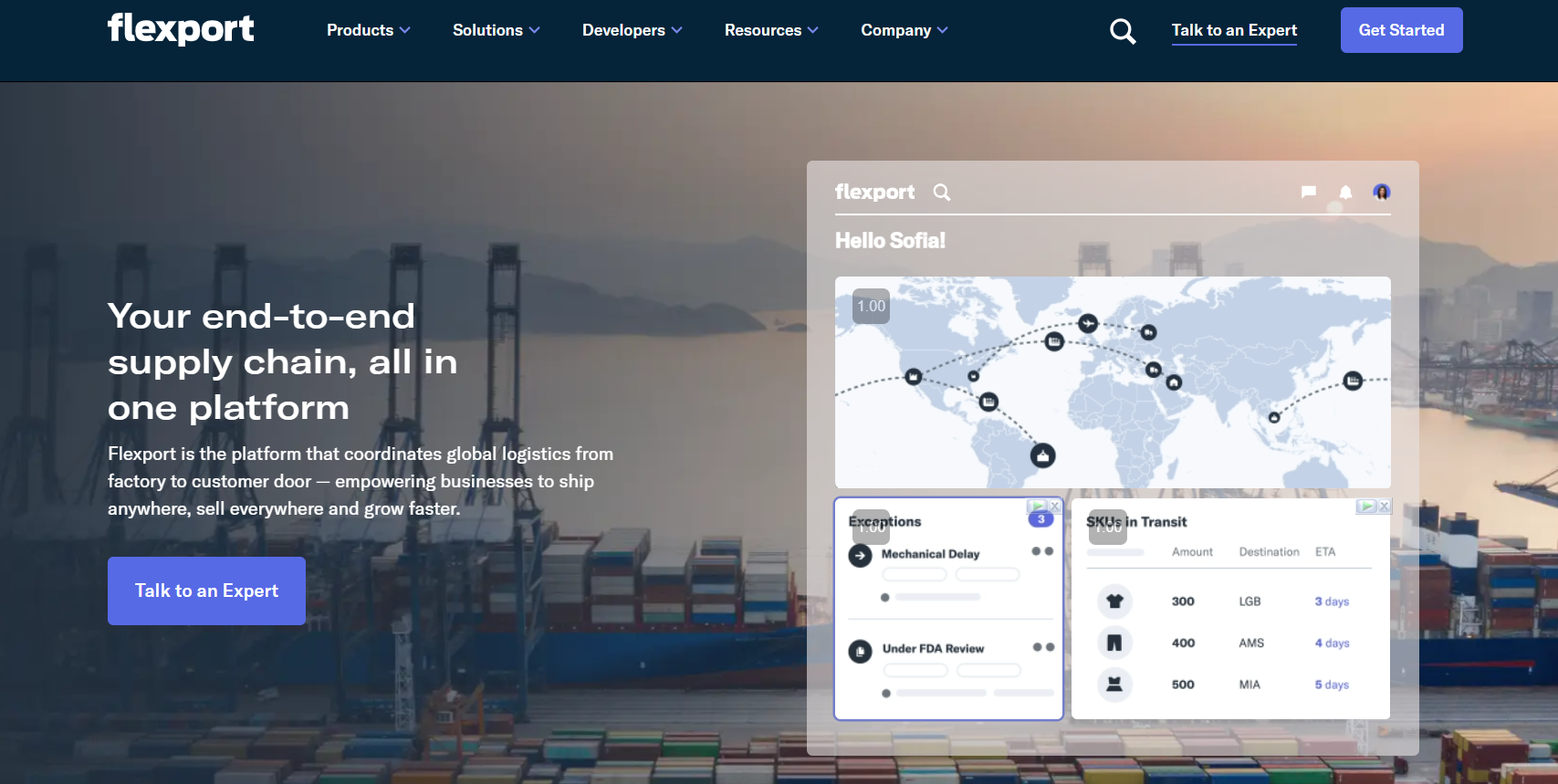
Flexport is a leading provider of international logistics solutions, offering a comprehensive range of services that include freight forwarding, customs brokerage, and supply chain management. Flexport’s technology-driven platform provides businesses with complete visibility and control over their global shipments, making it an ideal partner for companies involved in international trade.
Key Features: Flexport offers advanced tracking, international shipping, customs brokerage, and supply chain optimization. Their platform integrates with a variety of tools to provide real-time insights into shipping and logistics, helping businesses manage their international operations more efficiently.
What Sets Their Fulfillment Apart?: Flexport’s strength over many fulfillment companies lies in its ability to simplify the complexities of international shipping. With a focus on transparency and technology, Flexport provides businesses with the tools they need to navigate global supply chains, from compliance and customs to real-time tracking and cost management.
Website: https://www.flexport.com
Best For: Businesses that manage complex global supply chains or are looking to expand their operations internationally.
Pricing: Flexport offers custom pricing based on the specific needs of each business, including shipping volume, destinations, and additional services like customs brokerage and insurance.
Minimum Requirements: Varies by the scope of the business’s logistics needs, with services tailored to meet both small and large-scale operations.
Pros: Comprehensive global logistics solutions, advanced technology, transparency, and end-to-end visibility.
Cons: Higher costs and complexity may be challenging for smaller businesses or those new to international shipping.
Recommended Business Size: Best suited for medium to large-sized businesses with significant international shipping needs.
6. ShipBob
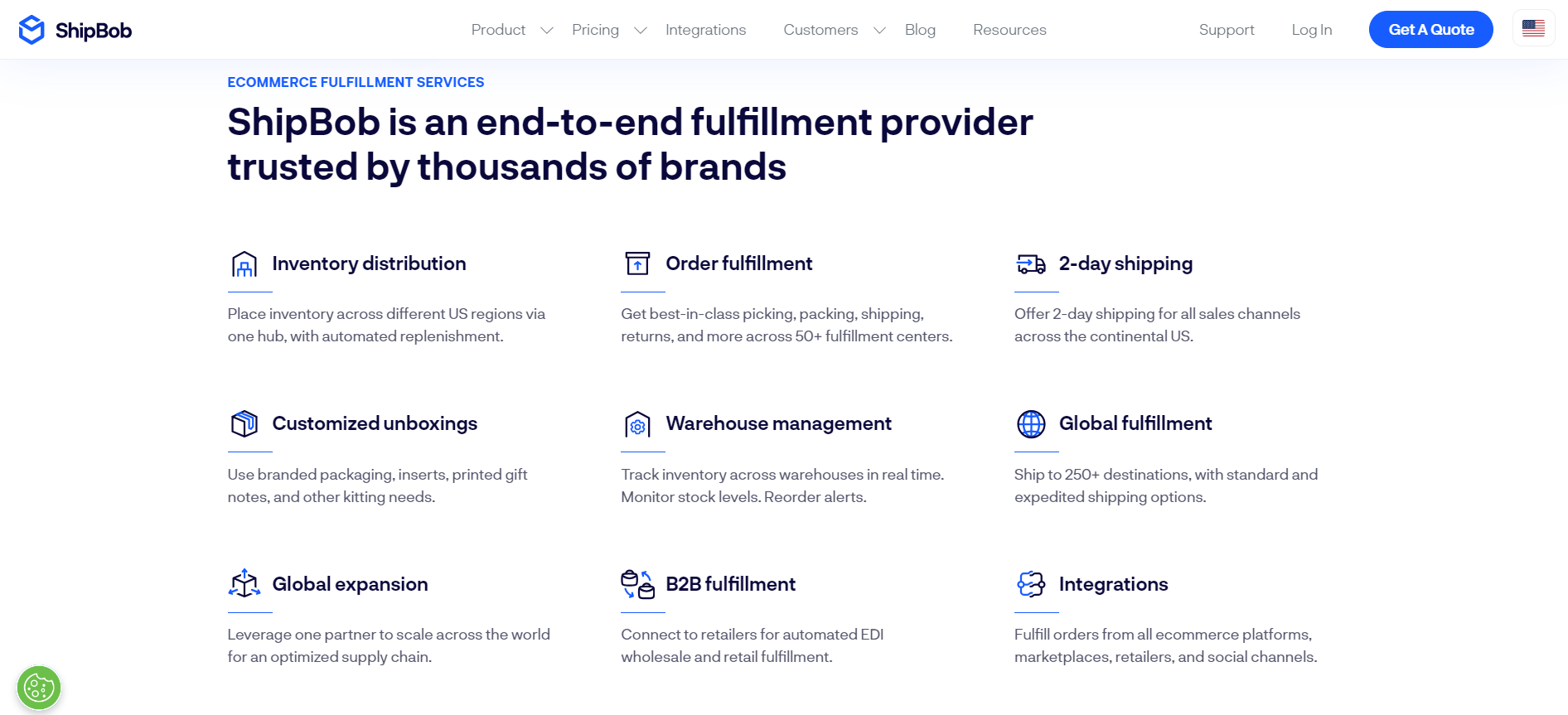
ShipBob is a popular choice for businesses that need fast and scalable fulfillment across the United States. With a network of fulfillment centers strategically located nationwide, ShipBob ensures that businesses can reach customers quickly, no matter where they are. Their platform is designed for ease of use, allowing businesses to manage inventory, orders, and shipping all from a single dashboard.
Key Features: ShipBob offers two-day shipping across the continental U.S., distributed inventory to reduce shipping times and costs, and integrations with major e-commerce platforms like Shopify, WooCommerce, and Amazon. Their analytics tools provide insights into inventory levels, shipping performance, and customer behavior, helping businesses optimize their operations.
What Sets Their Fulfillment Apart?: ShipBob’s distributed network of fulfillment centers enables businesses to store inventory closer to their customers, reducing shipping times and costs. This allows businesses to offer competitive shipping speeds, which can be a significant advantage in today’s fast-paced e-commerce environment.
Website: https://www.shipbob.com
Best For: Businesses looking to offer fast, nationwide shipping with the ability to scale as they grow.
Pricing: ShipBob’s pricing is transparent, with costs based on storage, order volume, and shipping needs. They offer a clear and straightforward pricing model that allows businesses to understand their fulfillment costs upfront.
Minimum Requirements: No strict minimums, making ShipBob accessible to businesses of various sizes, though their services are particularly beneficial for those with larger order volumes.
Pros: Fast nationwide shipping, distributed inventory, easy-to-use platform, and strong e-commerce integrations.
Cons: Limited to the U.S., which may not suit businesses with significant international shipping needs.
Recommended Business Size: Ideal for small to medium-sized businesses that require fast and reliable fulfillment across the United States.
7. Red Stag Fulfillment
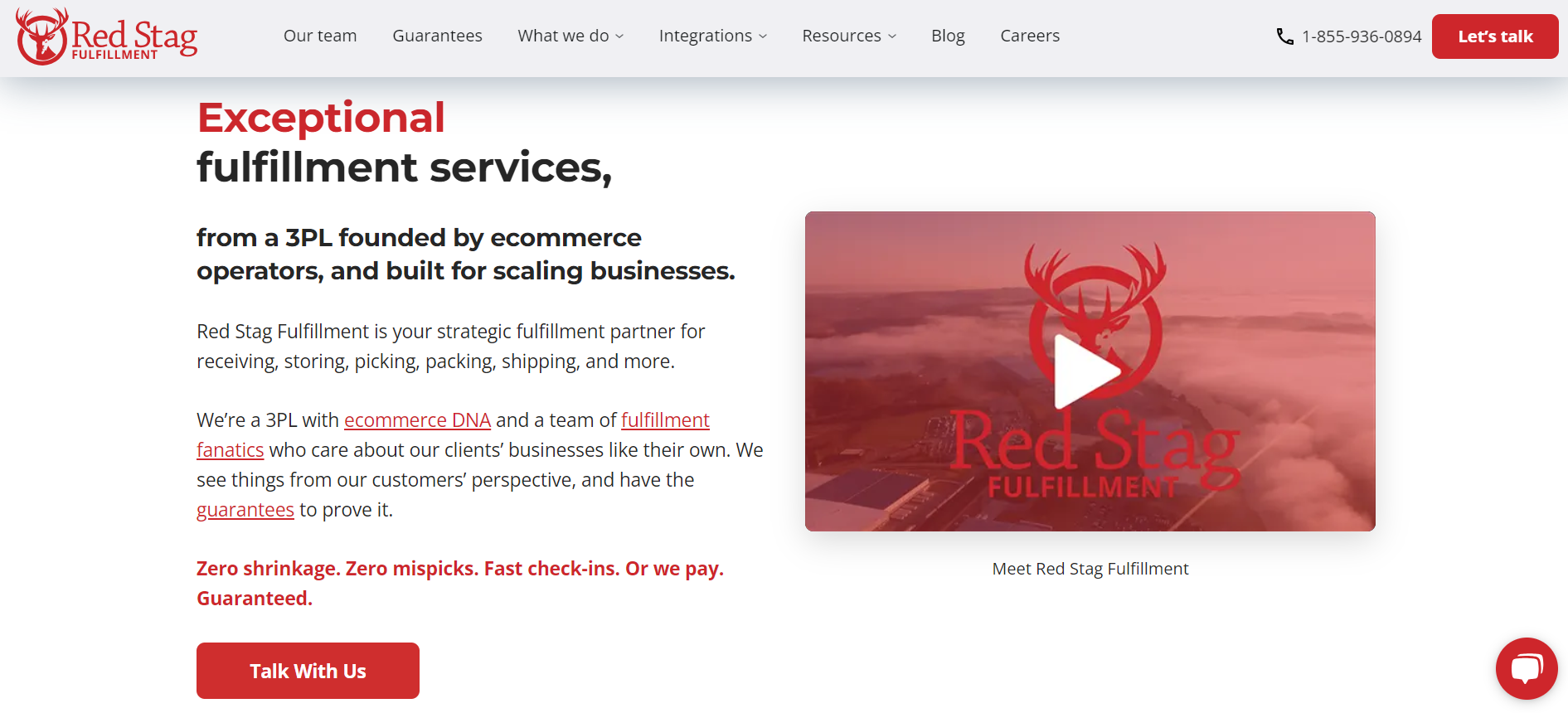
Red Stag Fulfillment specializes in handling large, heavy, and high-value products, offering a niche service for businesses that need more than just standard fulfillment. Their facilities are equipped to manage oversized and heavy items, ensuring that even the most challenging products are shipped safely and efficiently.
Key Features: Red Stag offers specialized handling for oversized, heavy, and fragile items, with a focus on security and accuracy. They provide a 100% order accuracy guarantee and a no-shrinkage policy, ensuring that businesses can trust them with their most valuable products. Their platform also offers real-time inventory management and order tracking.
What Sets Their Fulfillment Apart?: Red Stag’s ability to handle products that many other fulfillment centers cannot make them a unique option in the market. Their focus on security and accuracy is particularly valuable for businesses dealing with high-value or delicate items, ensuring that products arrive in perfect condition.
Website: https://redstagfulfillment.com
Best For: Businesses that need specialized fulfillment for heavy, oversized, or high-value products, such as furniture, electronics, or large machinery parts.
Pricing: Pricing is based on the specific needs of the business, including storage, handling, and shipping requirements. While Red Stag’s services may be more expensive than standard fulfillment options, the peace of mind they provide for handling challenging products can be well worth the cost.
Minimum Requirements: Red Stag typically works with businesses that have specific needs for handling large or ship orders of high-value items, making it more suited for companies in these niches.
Pros: Specialized handling for oversized and high-value goods, 100% order accuracy guarantee, robust security measures.
Cons: Higher costs, less suitable for businesses with standard or small-sized products.
Recommended Business Size: Best suited for medium to large-sized businesses that require specialized fulfillment for non-standard products.
8. ShipNetwork

ShipNetwork, previously known as Rakuten Super Logistics, offers tech-driven fulfillment services that cater to the needs of growing e-commerce brands. With a focus on speed, accuracy, and efficiency, ShipNetwork helps businesses meet the demands of a competitive online marketplace.
Key Features: ShipNetwork provides two-day shipping across the U.S., a proprietary SmartFill technology for automated order processing, and a nationwide network of fulfillment centers. Their platform integrates with major e-commerce platforms and marketplaces, allowing businesses to manage orders and inventory seamlessly.
What Sets Their Fulfillment Apart?: ShipNetwork’s SmartFill technology is designed to optimize order processing and shipping, ensuring that businesses can fulfill orders quickly and accurately. Their focus on technology and efficiency makes them a strong partner for e-commerce brands looking to scale.
Website: https://www.shipnetwork.com
Best For: E-commerce businesses that need fast, reliable fulfillment with a focus on technology and efficiency.
Pricing: Pricing is customized based on the business’s needs, with costs depending on factors like order volume, storage, and shipping requirements. ShipNetwork offers flexible pricing plans that can grow with the business.
Minimum Requirements: Typically works with businesses that have a steady order volume and are looking to scale, making it more suited for growing brands.
Pros: Fast shipping, advanced technology for order processing, seamless integration with e-commerce platforms.
Cons: U.S.-centric, which may limit options for businesses with international customers.
Recommended Business Size: Ideal for small to medium-sized e-commerce brands that are looking to scale and need a tech-driven fulfillment solution.
9. BigCommerce
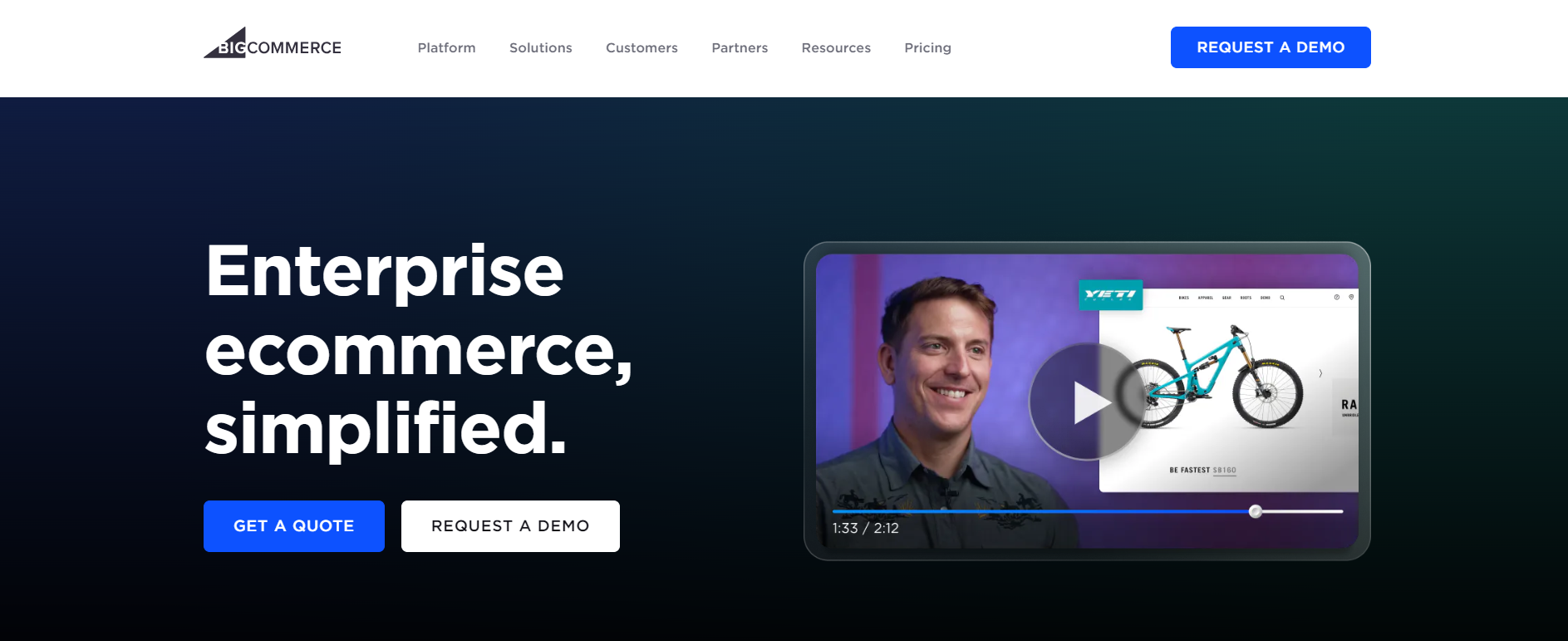
BigCommerce is a leading e-commerce platform that offers built-in fulfillment options as part of its comprehensive suite of services. Designed to streamline the entire process of running an online store, BigCommerce’s fulfillment solutions are integrated directly into their platform, allowing businesses to manage everything from sales to shipping in one place.
Key Features: BigCommerce provides built-in integrations with major fulfillment providers, automated order processing, and real-time shipping rates. The platform also offers multi-channel selling, allowing businesses to reach customers across different sales channels while still managing inventory and fulfillment centrally.
What Sets Their Fulfillment Apart?: The seamless integration of fulfillment services within the BigCommerce platform makes it easy for businesses to manage their operations without needing to juggle multiple systems. This is particularly beneficial for businesses that want to keep their e-commerce operations streamlined and efficient.
Website: https://www.bigcommerce.com
Best For: E-commerce businesses already using or considering the BigCommerce platform that want integrated fulfillment services.
Pricing: Pricing is dependent on the specific fulfillment provider used within the BigCommerce platform, with various options available to suit different needs and budgets.
Minimum Requirements: Requires a BigCommerce subscription, making it most suitable for businesses already using or planning to use BigCommerce.
Pros: Seamless integration, multi-channel selling, automated order processing, and real-time shipping rates.
Cons: Limited flexibility for businesses not using BigCommerce, reliance on third-party fulfillment providers.
Recommended Business Size: Best for small to medium-sized businesses that want an all-in-one e-commerce and fulfillment solution.
10. ShipHero
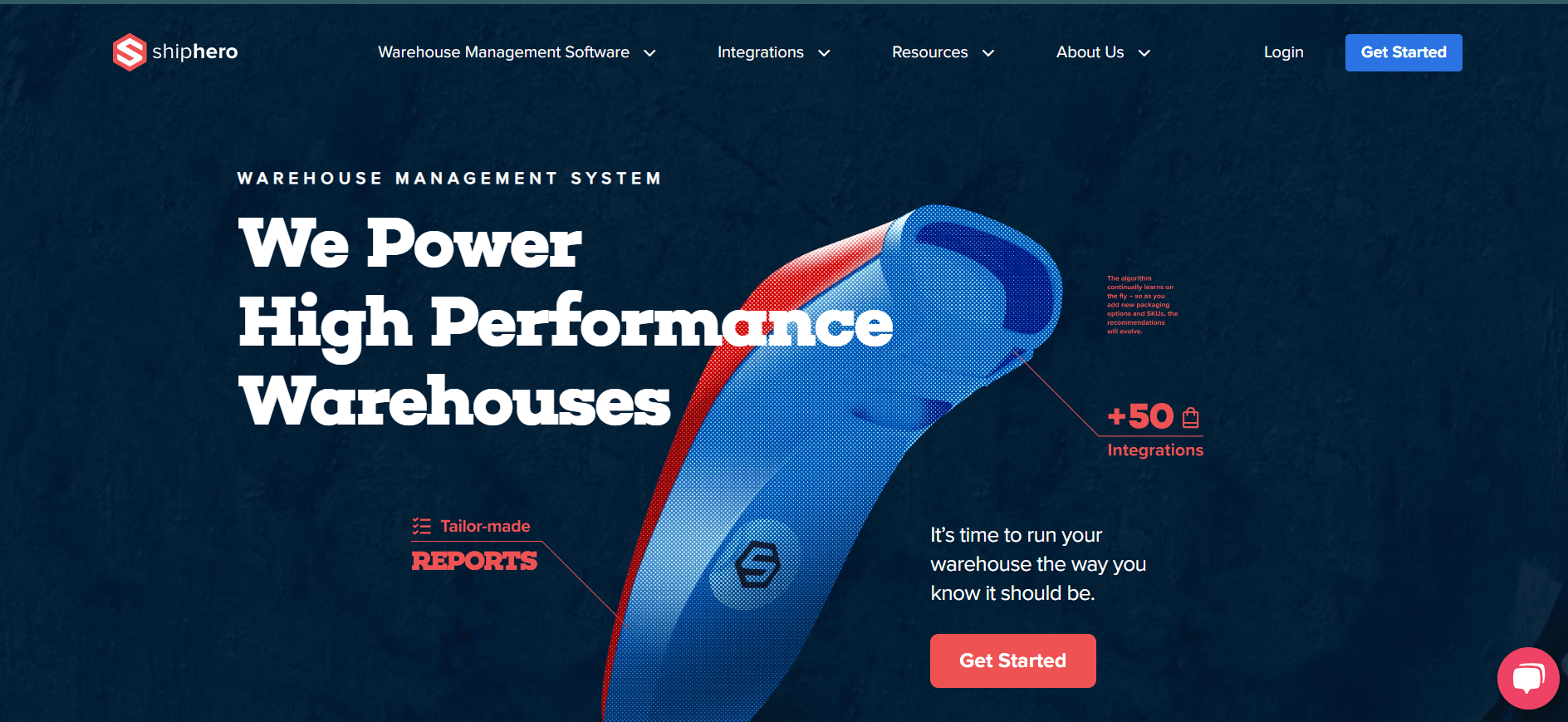
ShipHero offers a flexible and scalable fulfillment solution tailored to the needs of e-commerce businesses. With a network of fulfillment centers across the U.S. and a technology-driven platform, ShipHero helps businesses manage their orders, inventory, and shipping with ease.
Key Features: ShipHero provides distributed inventory across the U.S., fast shipping, and advanced order management tools. Their platform integrates with major e-commerce platforms, offering real-time inventory tracking, order automation, and robust analytics to help businesses optimize their operations.
What Sets Their Fulfillment Apart?: ShipHero’s focus on flexibility and scalability makes it an ideal partner for e-commerce businesses that need a fulfillment solution that can grow with them. Their platform’s advanced technology provides businesses with the tools they need to streamline their fulfillment processes and improve efficiency.
Website: https://shiphero.com
Best For: E-commerce businesses that need a scalable fulfillment solution with strong technological support and distributed inventory storage.
Pricing: ShipHero offers flexible pricing based on storage, order volume, and shipping needs, with no long-term contracts, making it accessible for businesses of various sizes.
Minimum Requirements: ShipHero works with businesses of all sizes, though their services are particularly beneficial for those with growing order volumes.
Pros: Flexible and scalable, strong technological platform, distributed inventory, and fast shipping.
Cons: U.S.-centric, which may limit options for international fulfillment companies.
Recommended Business Size: Ideal for small to medium-sized businesses that are scaling rapidly and need a fulfillment partner that can keep up with their growth.
How to Choose the Right Ecommerce Fulfillment Partner
Assess Your Business Needs and Goals
Before selecting a fulfillment partner, it’s essential to have a clear understanding of your business requirements. This includes evaluating your product types, order volume, and target market. For example, if you sell fragile or temperature-sensitive products, you’ll need a top fulfillment center or provider that can handle these items with care.
Define your budget and desired level of control over the fulfillment process. Some businesses prefer a hands-off approach, while others want more involvement in the day-to-day operations. Consider your growth plans and seasonal fluctuations, as your chosen fulfillment partner should be able to scale with your business.
Research and Compare Fulfillment Providers
Once you have a clear understanding of your business needs, start researching potential fulfillment providers. Read customer reviews and case studies to gain insights into their performance and reliability. Look for providers with experience in your industry or product niche.
Request quotes from multiple providers and compare their pricing structures. Keep in mind that the cheapest option may not always be the best choice. Evaluate each provider’s technology, integrations, and reporting capabilities to ensure they align with your business requirements.
Key Factors to Consider When Comparing Providers
Warehouse locations and shipping zones: Choose a provider with warehouses close to your target market to reduce shipping times and costs.
Inventory management system: Look for a provider with a robust, real-time inventory management system that integrates seamlessly with your ecommerce platform. Understand the significance of accurate ecommerce inventory tracking to ensure order accuracy and uncover strategies to enhance it.
Returns processing: Ensure the provider has an efficient returns processing system to maintain customer satisfaction.
Customer support: Select a provider with responsive and knowledgeable customer support to help resolve any issues quickly.
Test and Monitor Performance
Before committing to a long-term contract, start with a trial period or a small batch of orders to test the fulfillment provider’s performance. Track key metrics such as order accuracy fulfillment cost, shipping speed, and customer satisfaction to ensure they meet your expectations.
Regularly review and optimize your fulfillment strategy to identify areas for improvement. This may involve adjusting your inventory levels, updating your packaging, or exploring new shipping options. Continuously monitoring and refining your fulfillment process will help you stay competitive and meet evolving customer expectations and demands.
Establish Clear Communication and Expectations
Effective communication is key to a successful partnership with your fulfillment provider. Establish clear expectations regarding order processing times, inventory management, and reporting requirements. Schedule regular check-ins to discuss performance, address any concerns, and explore opportunities for improvement.
Ensure that your fulfillment partner understands your brand values and customer service standards. They should be an extension of your business, representing your brand in a positive light and providing excellent service to your customers.
Consider Scalability and Future Growth
As your ecommerce business grows, your fulfillment needs will evolve. Choose a fulfillment partner that can accommodate your future growth and adapt to changing market conditions. They should have the infrastructure, technology, and expertise to handle increasing order volumes and expand into new markets if necessary.
Discuss your long-term goals with potential fulfillment providers and assess their ability to support your growth. A scalable fulfillment solution will help you avoid costly and disruptive transitions as your business expands.
By carefully assessing your business needs, researching providers, and monitoring performance, you can select the right ecommerce fulfillment partner to support your business’s success. Remember, finding the best ecommerce fulfillment provider and service is an ongoing process that requires regular evaluation and optimization to ensure you’re receiving the highest level of service and value
Start Your Ecommerce Fulfillment Journey With The Right Partner for Your Business
Ecommerce order fulfillment is a critical aspect of running a successful online store. By outsourcing to specialized services, you can save costs, improve shipping times, and scale your business effectively. Make sure that your ecommerce fulfillment company is among the top picks for 2024. Looking to enhance your ecommerce fulfillment process? Discover key strategies to streamline your online store’s order processing, packaging, and delivery.
When selecting a fulfillment partner, consider your business goals, product characteristics, and integration requirements. Compare pricing plans, shipping carrier partnerships, and performance metrics to find the best fit. Don’t forget to test and monitor your chosen provider to ensure optimal results.
Are you ready to streamline your order fulfillment process and take your ecommerce business to the next level? Start by evaluating your current setup and researching potential partners. With the right order fulfillment company on your side, you can focus on growing your brand while leaving the logistics to the experts.






